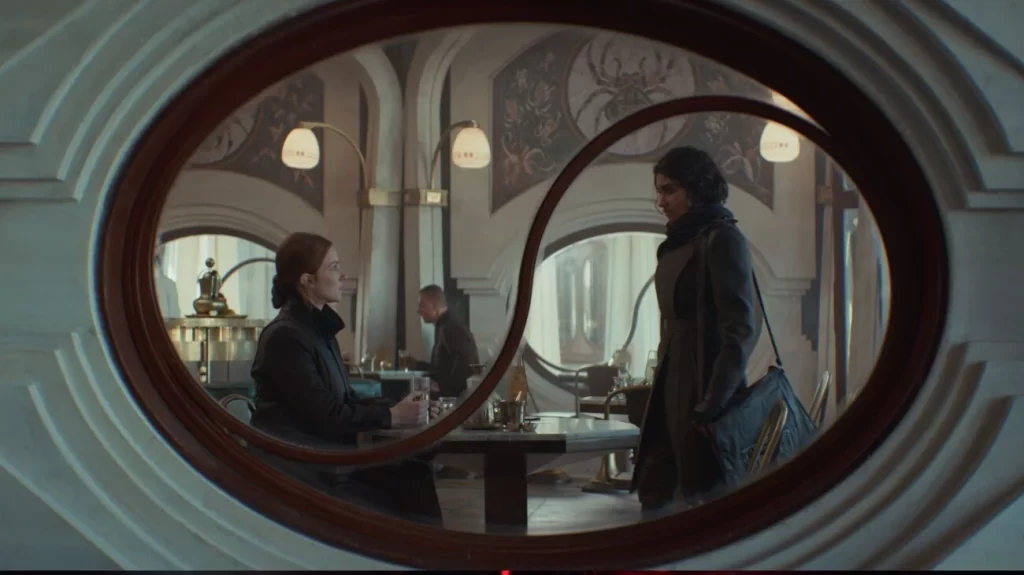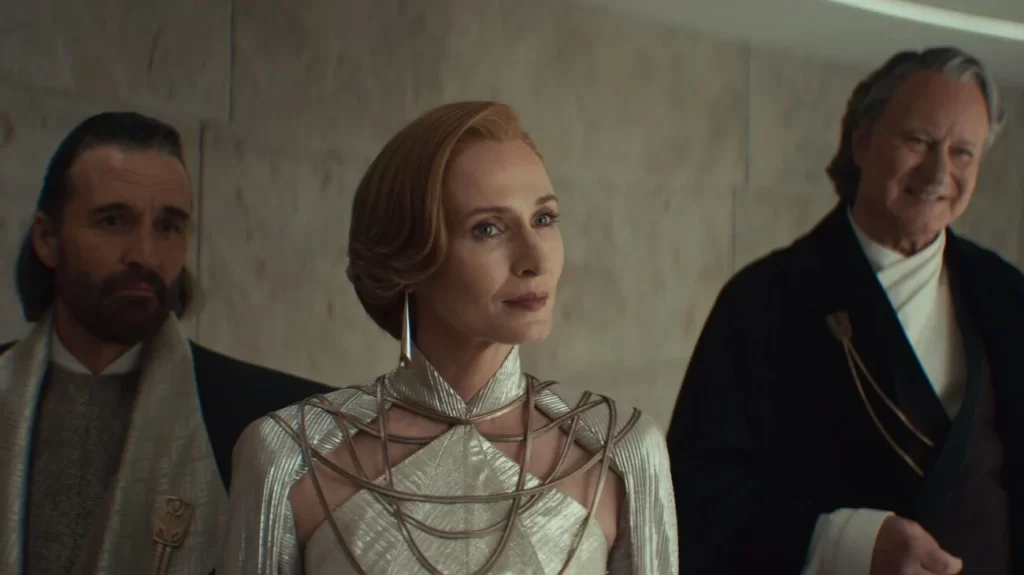In this Andor Season 2 Episodes 4-6 Review(“Ever Been to Ghorman?”, “I Have Friends Everywhere”, and “What a Festive Evening”) we see that Star Wars brings some of the most gripping storytelling in its history. These episodes delve deeply into the realities of rebellion, revealing the cost of fighting for freedom and the moral dilemmas it entails.
Rebellion, Sacrifice, and Moral Ambiguity
Rather than presenting a simple fight between good and evil, Andor challenges viewers to see the shades of gray in the galaxy’s struggles. At the center of this arc is Orson Krennic’s quote: “Ah, my rebel is your terrorist…”, a statement that echoes through every decision and sacrifice made by the characters.
If you’ve been drawn to Andor’s grounded take on the Star Wars universe, this arc offers even more to appreciate. It explores the pain points of rebellion—broken trust, grief, and the heavy burden of sacrifice—all while showing how the Empire tightens its grip on the galaxy.
The characters’ struggles feel personal and raw, from Cassian Andor’s fight for survival to Mon Mothma’s delicate balancing act in the Senate. The Tarkin Massacre looms over the events on Ghorman, reminding us of the brutal cost of resistance and the stakes involved in fighting an oppressive regime.
Krennic’s quote sets the tone for the episodes, forcing both the characters and viewers to ask hard questions:
- What does it mean to fight for justice when the methods you use mirror those of your oppressors?
- How do you balance the need for freedom with the price it demands?
With its deep storytelling and thought-provoking themes, this arc cements Andor as one of the most daring and engaging chapters in the Star Wars saga.
Episode Recaps
As we continue this Andor Season 2 Episodes 4-6 Review, it’s clear that these episodes stand out for their ability to blend emotional depth with political intrigue, creating an unforgettable arc in the Star Wars saga.
Episode 4: “Ever Been to Ghorman?”
The arc begins with Cassian Andor taking on a mission for Luthen Rael. Posing as a fashion designer, Cassian infiltrates a rebel cell on Ghorman led by Carro Rylanz and his daughter Enza. Right away, there’s tension between Cassian’s cautious, methodical approach and the Ghorman’s fiery drive for action. Cassian knows from experience how dangerous impulsiveness (and the Empire) can be, but the Ghorman rebels, scarred by the Tarkin Massacre, don’t trust his pragmatism.
Meanwhile, Syril Karn is embedded as a double agent for the Empire. He believes the Empire is a force for order and thinks outside forces are manipulating the Ghormans. However, as he sees the suffering of the Ghorman people, cracks begin to form in his loyalty.
This subplot adds complexity to the story, showing how individuals within the Empire can question their beliefs. The episode sets up the rebellion’s struggles on Ghorman, highlighting how personal pain and political oppression fuel both sides of the conflict.
Episode 5: “I Have Friends Everywhere”
The second episode dives deeper into the emotional and political stakes of the rebellion. Vel Sartha and Cinta Kaz arrive on Ghorman, and their strained relationship takes center stage. Vel struggles to balance her leadership role with her feelings for Cinta, something that will reach devastating results in this arc.

On Coruscant, Mon Mothma attends a high-society event with her husband, Perrin Fertha. The gathering is filled with spies and Imperial agents, making clear the constant danger Mon faces as she secretly builds alliances. Meanwhile, Kleya Marki removes a bug planted by the Empire, further proving her role as the rebellion’s quiet but effective mastermind.
Episode 6: “What a Festive Evening”
The final episode of the arc delivers a powerful yet tragic conclusion. A loss causes the characters and the audience to confront the sacrifices made in the fight for freedom.
Elsewhere, Mon Mothma continues her delicate political maneuvering, building alliances while maintaining her image as a loyal senator. On the frontlines, Wilmon Paak trains under Saw Gerrera, learning the brutal realities of guerrilla warfare. Meanwhile, Bix Caleen faces her past trauma head-on, taking down Dr. Gorst in a moment of cathartic triumph.
The arc ends with a bittersweet victory for the rebels: they achieve their mission, but the threat of Imperial retaliation looms large.
Krennic’s Quote and the Cost of Rebellion
At the core of this arc is Krennic’s observation: “Ah, my rebel is your terrorist…”. This quote forms the foundation of the story, showing how the Empire and the rebellion are locked in a constant struggle to define the narrative. The rebellion is starting to take shape as a cohesive group instead of a collection of cells. Each character reflects this theme, grappling with the choices they make and the consequences of their actions.
- Luthen Rael knows that the rebellion must sometimes use the Empire’s own tactics to survive. His Season 1 quote—“I burn my decency for someone else’s future…”—haunts his every move. He accepts being seen as a terrorist if it means the rebellion has a chance at victory. He knows he will never be part of the larger rebellion, as they will have to distance themselves from his methods. The very techniques that allowed them to have the luxury of being able to disavow him.
- Cassian Andor understands Luthen, probably better than anyone, besides Kleya. However, it wants more. He doesn’t want to be the matches that set off the rebellion; he wants to be part of the fire that allows it to overtake the Empire. His family unit helps him see the bigger picture, that there is something to fight for that he wants to return home to.
- Syril Karn offers a unique perspective. To him, the Empire is a symbol of stability, while the rebels represent chaos. Yet, his growing empathy for the oppressed hints at an internal conflict that could change his future.
- Vel Sartha and Cinta Kaz personify the emotional cost of rebellion. Much like Cassaian, she see the results of Luthen’s actions with devastating results. She, too, has to redefine herself: is she a rebel with a bigger idea or a terrorist who causes the Empire to react?
- Mon Mothma operates in the shadows of Coruscant, walking a fine line between serving the Empire publicly and secretly building the rebellion. Her story illustrates the dangers of challenging the Empire while maintaining a façade of loyalty.
- Kleya Marki focuses solely on results. She represents the rebellion’s cold efficiency, showing the darker, less emotional side of the fight for freedom. Luthen has regrets and worries; she doesn’t.

The Empire’s Scheming on Ghorman: “If You Aren’t For Us, You’re a Terrorist”
The Empire’s actions on Ghorman reveal its ruthless strategy of labeling any dissent as treachery. Its stance is simple: if you’re not with the Empire, you’re against it.
This binary thinking is key to the Empire’s propaganda machine, where all opposition is branded as terrorism. On Ghorman, the Empire uses fear, manipulation, and infiltration to inspire the Ghormans to rebel. They want the Ghormans to rebel so they can play the role of saviors of an unruly threat to the Empire.
This strategy forces rebels like Mon Mothma and Cassian to fight not only physical battles but also ideological ones. The Empire’s control over public perception makes it harder for the rebellion to gain sympathy, even when the Ghormans and the rebellion are in the right. This manipulation of truth and fear ensures that rebellion comes at a steep price, one that the characters—and the viewers—cannot ignore.
Why I am Using “Terrorist” Here
The use of the word “terrorist” in this post is deliberate and unavoidable, particularly in light of the Empire’s ability to control the narrative. In the next arc, the Empire’s state media discusses an attack and notes that no one has claimed responsibility.
This moment reinforces Orson Krennic’s quote—“Ah, my rebel is your terrorist…”—a thematic anchor that forces the audience to confront the moral and ideological dimensions of rebellion. The term “terrorist” cannot be skirted around here because it is central to the Empire’s framing of resistance. The Rebels’ actions, while driven by the goal of freedom, are portrayed as violent and disruptive—a narrative the Empire uses to justify its authoritarian grip.
In today’s world, terrorism is rightly viewed as an evil, especially when it appears to lack a clear objective for independence or peace. Too many organizations are only about creating terror with no end goal. That is not what I am comparing Luthen to. He wants peace. He wants a world free from totalitarian rule.
As this FPRI article “Rogue One: A Terrorist Story” reminds us that state-sponsored terrorism is just as real and often overlooked. The article cites how the Empire uses propaganda to delegitimize the Rebel Alliance, branding their actions as terrorism while ignoring the atrocities committed by the state itself.
This dynamic mirrors real-world examples, such as the CIA’s involvement in covert operations that resemble the Empire’s tactics on Ghorman. The FPRI article makes it clear that Rogue One—and by extension, Andor—asks us to question how we define terrorism and who gets to control that definition.
The Empire’s narrative control, like that of many oppressive regimes, ensures that any resistance is labeled illegitimate, regardless of its cause or justification. This should make us uneasy. If we aren’t asking ourselves why this is happening and only running to kill them all, we will never stop the threat. (Again, I acknowledge that some people do indeed just want to watch the world burn).
While Andor resonates with contemporary politics, it is not a direct commentary on current events. In fact, the film was completed in February 2024. The series reflects timeless truths about power and resistance. Oppressive systems, whether in the real world or a galaxy far, far away, will always provoke rebellion. What we have to examine is what allows systems to be oppressive. Andor demonstrates how media, propaganda, and outright provocation can reinforce the grip of oppression.
Andor does not merely look to the present or future—it draws heavily from the past, examining historical patterns of resistance and repression. From the Empire’s propaganda machine to the Rebels’ morally ambiguous tactics, the show challenges us to confront the uncomfortable truths about rebellion, power, and the cost of freedom.
Luthen, while never calling himself a terrorist, understands his role. The quote mentioned earlier is part of a larger one. The bold segments are mine.
Calm. Kindness. Kinship. Love. I’ve given up all chance at inner peace. I’ve made my mind a sunless space. I share my dreams with ghosts. I wake up every day to an equation I wrote 15 years ago from which there’s only one conclusion, I’m damned for what I do. My anger, my ego, my unwillingness to yield, my eagerness to fight, they’ve set me on a path from which there is no escape. I yearned to be a savior against injustice without contemplating the cost and by the time I looked down there was no longer any ground beneath my feet.
What is my sacrifice?
I’m condemned to use the tools of my enemy to defeat them. I burn my decency for someone else’s future. I burn my life to make a sunrise that I know I’ll never see. And the ego that started this fight will never have a mirror or an audience or the light of gratitude.
So what do I sacrifice?
Everything!
Luthen and Kleya, as we will see, know how devastating the state-sponsored terrorism of the Empire is. They understand that for a real, organized, and moral rebellion to exist under someone like Mon Mothma, their type of rebellion must exist first.
Andor Season 2 Episodes 4-6 Review – Final Thoughts: A Bittersweet Triumph
Episodes 4-6 of Andor Season 2 deliver a masterclass in storytelling. This arc combines emotional depth, political intrigue, and moral complexity, forcing the characters—and the audience—to confront the harsh realities of rebellion.
Krennic’s quote serves as a reminder that the fight for freedom is never simple, and the cost of justice is often painfully high.
With its layered storytelling and powerful themes, this arc proves why Andor is one of the most compelling entries in the Star Wars saga. This arc is vastly superior to the first arc of the season. In fact, it is nearly flawless.
What is scary is that the next two arcs are even better.
About The Author
Discover more from NolaNerdCouple.com
Subscribe to get the latest posts sent to your email.
